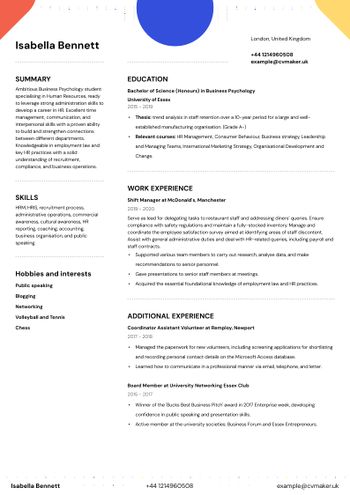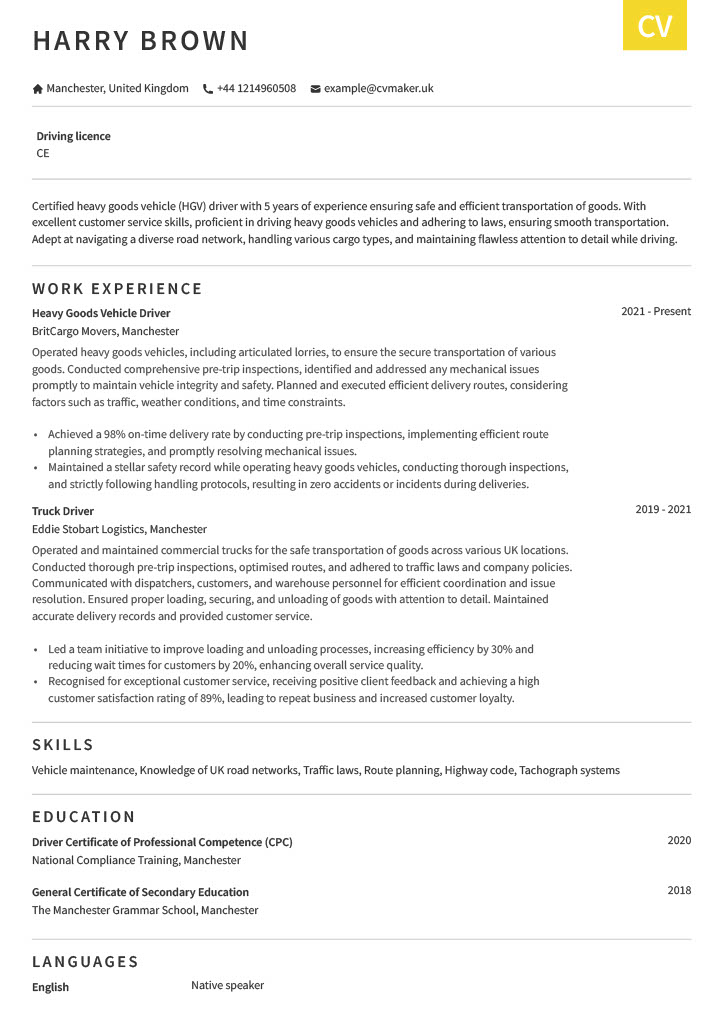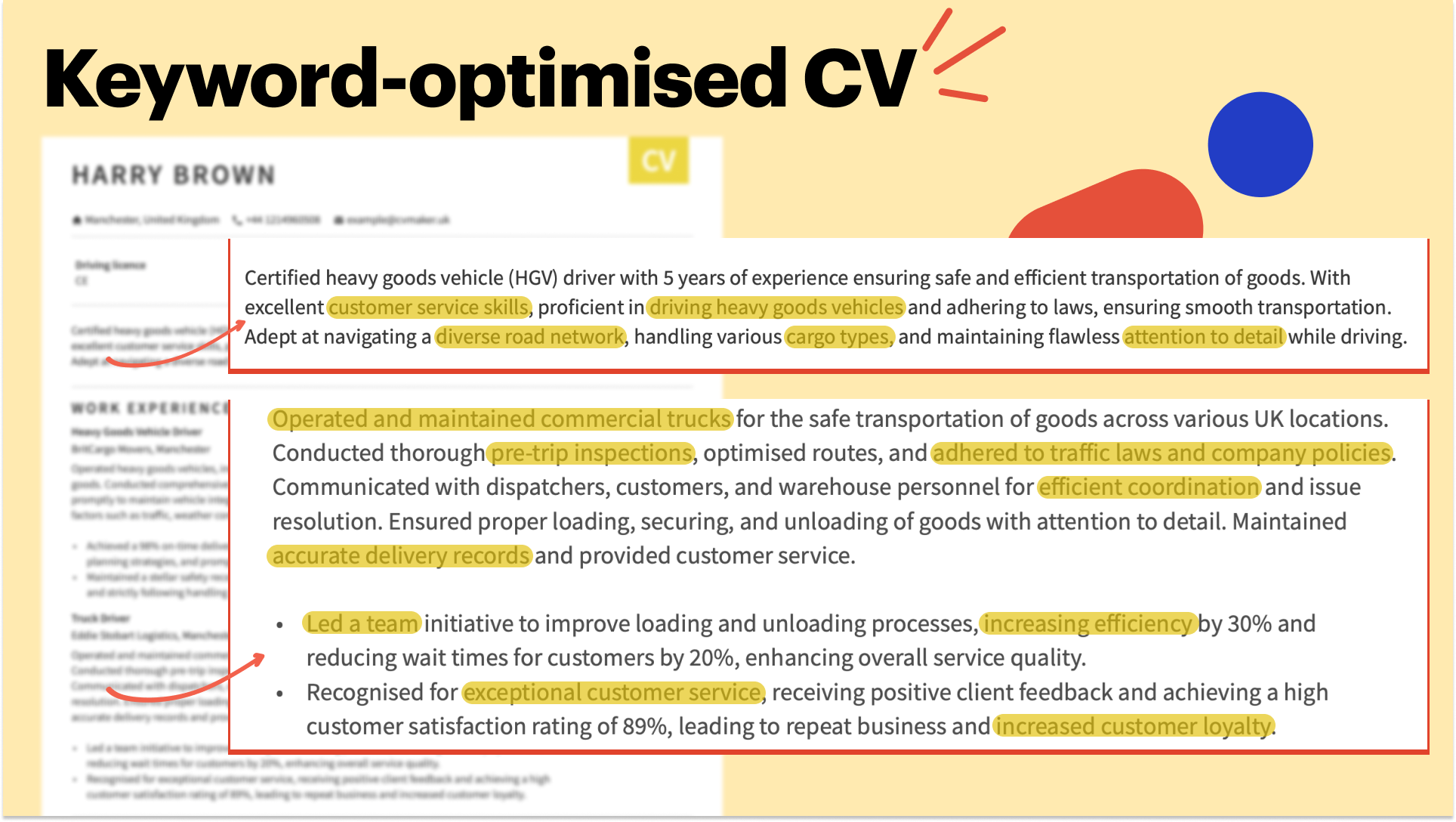When applying for jobs online, one of the biggest challenges is navigating applicant tracking systems (ATS) and catching employers’ eye. Even if your application looks good, this software could be one of the reasons you’re not getting interviews, and this is where CV keywords and phrases come in. These specific terms and expressions help your CV stand out, both to machines and human recruiters. Whether you're a recent school leaver, an experienced professional, switching careers, or aiming for a promotion, a keyword-optimised CV is essential for grabbing employers’ attention in the UK.
In this guide, we cover:
How to add CV keywords to outsmart ATS
How to include them effectively, avoiding keyword stuffing
The best CV sections for keywords
Practical examples tailored to various professions and levels of experience.
The Best CV Builder
Effortlessly create a professional CV
Easy to use on any device
Integrated spelling and grammar check
Customisable job-specific CV examples

What is a CV keyword?
A keyword for a CV or cover letter is a specific word or phrase that reflects the industry-specific terminology, qualifications, experience and skills employers look for in candidates. These keywords are often directly taken from the job description and are essential for making your CV searchable and scannable.
To achieve a good CV, it’s very important to first write a master CV, an all-inclusive document containing all your relevant information. Then, tailor it to each job application by incorporating specific keywords that align with the role and vacancy. This approach not only demonstrates that you’ve put effort into the application but also highlights why you are a great fit for the job.
How to find relevant keywords
To create a professional application, it's essential to use the right language and align with industry expectations. By researching job ads, exploring company websites (like their ‘about us’ or ‘careers’ pages), and reviewing CV examples within your field, you can identify common terms and phrases that will help tailor your application effectively.
Here's an example of how a job description can help you identify relevant keywords to improve a software developer CV:
| Job description | Relevant keywords and phrases |
|---|---|
| Design, build, and maintain back-end services using Go | Go programming, back-end development, scalable systems, software engineering |
| Improve the performance and scalability of our system | System performance optimisation, scalability engineering, performance tuning |
| Be responsible for pragmatic technical decision-making to ensure we're delivering high-quality software as quickly as possible | Pragmatic decision-making, software quality, continuous delivery, agile development |
| Make incremental improvements and simplifications to our system’s architecture to improve development velocity, scalability, and deployment resilience | Incremental delivery, system architecture, scalability, deployment resilience, development velocity |
| Work collaboratively with Product Management to ensure a delightful customer experience | Cross-functional collaboration, stakeholder engagement, product-driven development, customer-focused solutions |
| Strong interest in Cyber security | Cyber security awareness, secure coding practices, application security, data protection principles |
| Experience working on technical projects remotely, alone, and on small teams | Remote collaboration, independent work, small team environments, self-motivated |
| Strong communication and collaboration skills with engineers and stakeholders | Communication skills, team collaboration, stakeholder communication, interpersonal skills |
Use your personal profile to showcase key soft skills from the job description in action
"A self-motivated and collaborative software engineer with hands-on experience in Go programming and back-end development. Skilled in designing scalable systems and optimising performance for high-availability platforms. Known for pragmatic decision-making, strong communication skills, and the ability to work effectively in remote and small-team environments. Passionate about cyber security and committed to building secure, customer-focused solutions through agile development and stakeholder engagement".
Integrate keywords into your experience section to justify your outcomes
"Delivered scalable back-end services using Go, contributing to the stability and growth of a secure, high-performance system. Improved system performance and deployment resilience, reducing downtime by 30% through targeted optimisations and architectural simplifications".

Examples of CV keywords for different roles and industries
For every industry, job, and role (and also experience level), you'll need to include specific keywords that work best for your CV. Here are some good keyword examples:
| Industry/role | Keywords |
|---|---|
| Marketing | Content creation, SEO strategy, Campaign management, Brand development, Market research |
| HR | Employee relations, Talent acquisition, Onboarding, HR compliance, Performance management |
| Project management | Budget control, Agile methodology, Stakeholder engagement, Risk assessment, Deliverables |
| Cleaner | Sanitisation, Deep cleaning, Waste disposal, COSHH compliance, Attention to detail |
| School leaver | Punctual, GCSE qualified, Teamwork, Initiative |
| Nanny | Child development, Meal preparation, First aid certified, Safeguarding, Routine management |
| Retail | Cash handling, Stock replenishment, Customer service, Point of sale (POS), Sales targets |
| Software engineer | Python / Java / C++, Full-stack development, Git version control, API integration, Debugging |
| Finance | Financial reporting, Budget forecasting, Cost analysis, Auditing, Compliance |
| IT | Troubleshooting, Network administration, Cyber security, Helpdesk support, Cloud computing |
Good and bad CV keywords: mistakes to avoid
Do
Use keywords that match the job requirements.
Be specific and quantify results where possible.
Incorporate both technical and soft skills.
Don't
Overload your CV with buzzwords that don’t add value.
Copy-paste entire job descriptions.
Use acronyms without spelling them out at least once.
Good examples include clear, specific terms that match job descriptions and are easily picked up by ATS: project management, customer relationship management, budget forecasting, agile development
Bad examples are often vague, overused, or too subjective to add real value: hard worker, team player, go-getter, people person, tech-savvy
ATS keywords to format a CV
Creating a keyword-optimised CV isn’t just about the content. It’s also about how your document is formatted. We recommend using clear and standard headings like “Work Experience”, “Education”, “Skills” and avoid unusual formats, tables, or graphics that ATS systems may struggle to read.
Example of a well-formatted CV

Download this free HGV Driver CV example in PDF.

Pro tip
Regarding the format of the information you include, keep in mind that your CV should match the keywords used in the job description. For instance, if a role lists “customer relationship management,” make sure to use that exact phrase instead of a synonym like “client liaison”.
Keywords for CV sections
Every section of your CV should feature carefully chosen keywords that align with the information you’re presenting. By incorporating the right keywords in the right places, your CV becomes more compelling, effectively highlighting your strengths and making a stronger impression.

Personal profile keywords
When writing a CV personal profile or summary statement, using the right keywords to describe yourself helps demonstrate your character and work ethic in a professional tone. These words give employers a quick snapshot of your personality traits, especially important for freshers, school leavers, or anyone changing careers.
Proactive
Reliable
Versatile
Curious
Enthusiastic
Passionate
Creative thinker
Pro tip
These words work best when backed by evidence elsewhere in your CV, such as projects, achievements, or responsibilities.

Work experience keywords
In the work experience section, focus on action verbs that show what you did and how you added value. These words signal leadership, initiative, and the ability to deliver results in a professional setting.
Achieved
Collaborated
Oversaw
Spearheaded
Executed
Pro tip
Describe your duties and responsibilities in a concise paragraph, then use bullet points with impactful action verbs to clearly highlight your key achievements.

Education section keywords
Even if you’re a recent graduate or school leaver, the education section offers space to demonstrate subject relevance, academic strengths, and transferable skills through well-chosen keywords.
GCSE-qualified
A-Level in…
Degree in…
Dissertation on
Academic project
Research skills
Coursework included
Pro tip
Where possible, tailor your listed subjects or projects to reflect skills or knowledge relevant to the job you're applying for.

Skills section keywords
The skills section is a great place to insert targeted keywords pulled directly from the job description, especially technical skills, tools, or platforms the employer expects you to know.
Microsoft Office Suite
CRM software
SQL / Data visualisation
Python
SEO
UX Writing
Pro tip
Where possible, indicate your proficiency level and tailor your listed tools to those mentioned in the job description. Group similar skills together (hard skills, technical skills, tools) to enhance readability and keyword relevance.
Keywords and phrases for a cover letter
Once you've written your CV, it's time to create a good keyword-optimised cover letter. To do so, echo the most relevant keywords from the job description while sounding natural. More than anywhere else in your application, it’s important to sound organic and not robotic. Incorporate keywords in a balanced way, between what you want to say, what the employer wants to read, and your unique ideas for presenting yourself and highlighting your professional qualities.
Keyword-optimised cover letter paragraph example
In my previous role at XYZ Company, I led the design and optimisation of back-end services using Go, improving system scalability and deployment resilience across our core platform. I also collaborated closely with product management to align engineering efforts with user experience goals. My experience includes working remotely on small, agile teams, where I made pragmatic technical decisions to streamline development velocity and system performance. Additionally, I have a strong interest in cyber security and have applied secure coding practices to protect application data and integrity. My ability to deliver clean, efficient, and scalable code, paired with my focus on collaboration and continuous improvement, makes me well-suited to contribute meaningfully to your engineering team.
CV keywords essentials
Use job descriptions to find the most relevant keywords and customise your CV for each application.
Include keywords naturally across all CV sections: personal profile, work experience, education, and skills.
Use a mix of hard skills, soft skills, and industry-specific terms to strengthen your application.
Your cover letter should also include tailored phrases to reflect your alignment with the role.
Avoid keyword stuffing. Focus on clarity, relevance, and authenticity.
Next steps?
Struggling to get shortlisted? Your CV might be missing the right keywords to get past ATS filters. Use our CV Writing Service to improve your CV and ensure it is tailored with the most relevant industry-specific keywords and phrases. For more inspiration, browse our CV examples across top UK industries, or explore our career blog for expert advice, including our guide on how to use AI to prepare for a job interview.
FAQs
Where should I put keywords in my CV?
You should place keywords throughout your CV, especially in your personal profile, work experience, education, and skills sections. They should be naturally integrated, not forced or repeated excessively.
If you're trying to land your first role, check out our guide on how to write a CV for your first job.
How do I find the right CV keywords for a job?
Start by analysing the job description and identifying repeated phrases and skill requirements. You can also check similar job ads, or review company websites for language they frequently use.
If you're used to searching for jobs on your mobile, explore our article on how to create a professional CV on your phone.
Do CV keywords really matter for ATS?
Yes. In 2026, most companies use ATS to scan CVs before a human sees them. Including relevant keywords greatly increases the chance your CV and cover letter will be shortlisted.
Be sure to check out our guide on the best fonts to make your CV ATS-friendly.
Can school leavers use keywords effectively?
Absolutely! If you're a fresher or recent graduate with little to no work experience, the right keywords can still make your CV impactful. Focus on education-related terms, transferable skills, internships, and any project work you’ve completed.
)



)

)